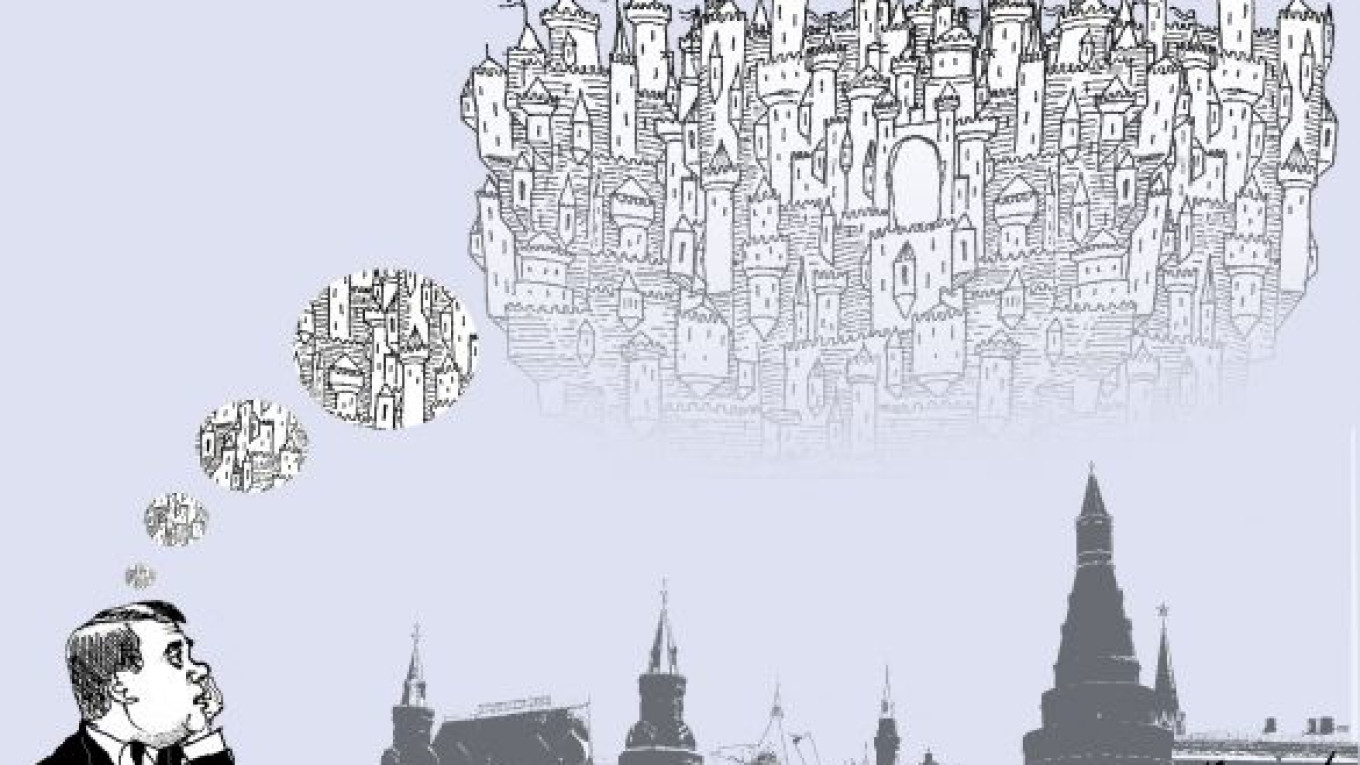Now that Russia’s economy is starting to recover, the Kremlin is returning to its goal of turning Moscow into a global financial center. To this end, the Kremlin is determined to liberalize financial laws and taxation, reform ineffective institutions and exploit Russian advantages such as well-educated employees and investment opportunities in major infrastructure projects.
President Dmitry Medvedev first announced the plan to make Moscow a global financial center in his address to the nation in late 2008. But he acknowledged last month that only five of the 48 points in the government plan adopted in June 2009 had been implemented so far.
On April 7, Sergei Shvestov, head of the Central Bank’s department for financial markets, said a takeover of the RTS by MICEX would be a key step toward this goal. And in late April, Alexander Voloshin, the pro-business chief of staff under former Presidents Boris Yeltsin and Vladimir Putin, was made head of a “special coordinating project group” in the efforts to make Moscow a global financial center.
Achieving this aim will clearly greatly benefit Russia, its companies and Moscow itself. But there is a long way to go, despite strong presidential support.
Many countries have ambitions to be financial centers. Large countries like India and China have significant and rapidly growing financial sectors to support their domestic financial needs, and foreign investors are often involved as users of those financial centers as they seek access to the domestic market. But international financial centers serve more than the domestic economy, which in the case of many countries is simply too small to support a significant financial center on its own.
True global centers also provide investor access to the assets of issuers in third countries and provide corporate finance services to those issuers. London, for example, is the base for many global fund managers wanting access to European markets, while Hong Kong is a center for Chinese companies to access international capital markets.
To gain a dominant position in global finance, Moscow needs to emulate these other centers and bring in business from outside. In Moscow’s case, the larger markets in the Commonwealth of Independent States could, in theory, be attracted to Moscow by better liquidity and superior access to foreign investors.
One problem, however, is size. Companies in the larger markets in the CIS, such as Kazakhstan and Ukraine, are more likely to list on their own domestic exchanges or in London, New York or Hong Kong, while the smaller republics cannot offer the size to transform Moscow into a global center even if they were to list all their companies there.
What’s more, with Russian companies preferring to list abroad, it is hard to see why companies from third countries should list in Moscow. While Russian companies used to list abroad partly as a question of prestige, today it is more a question of raising capital to help restructure their debt.
In addition to Moscow, there is a host of other cities that are aspiring to become global financial centers — Doha, Mumbai, Shanghai, Bangkok, Kuala Lumpur and Riyadh. Some of these aspirants have realistic business models and are not simply going head-to-head with existing centers. Moscow certainly has its work cut out for it as it pursues its global ambitions.
Some of the new aspirants favor niche targeting, for example Islamic finance in Malaysia. Others have taken the best from the existing financial centers and added a local access or time zone advantage, such as the Dubai International Financial Centre, which has adopted English law for finance, as has Qatar, but provides superior access to Middle Eastern markets. Moscow is hoping it can serve as a bridge between Europe and Asia.
True global financial centers have other features that attract foreign participation. There are four key requirements without which no center will attract international participation:
1. Communications infrastructure, including solid and uninterrupted international links and modern IT capabilities.
2. Legal certainty through clear commitment to the rule of law, protecting property rights and efficient legal processes. Fiscal structures and policies must also be clear and predictable.
3. Fair treatment. Markets must be better regulated so that local insiders are unable to exploit their position. Standards of governance of corporations and institutions must ensure disclosure and the fair treatment of minority shareholders through adequate and consistent disclosure.
4. Availability of skills at all levels either locally or through the free admission of foreign staff.
In the end, Russia needs to convince skeptical international investors that it can excel in all of these key areas. One of the greatest hurdles, however, is the country’s top-down management style, particularly in the government, and this will make Moscow less attractive to global market players. If the Kremlin cannot change this mentality, the largest players will always prefer the established global financial centers over Moscow.
Ian Pryde is CEO of Eurasia Strategy & Communications in Moscow, and Stephen Wells is head of its capital markets group and former chief economist at the London Stock Exchange.
A Message from The Moscow Times:
Dear readers,
We are facing unprecedented challenges. Russia's Prosecutor General's Office has designated The Moscow Times as an "undesirable" organization, criminalizing our work and putting our staff at risk of prosecution. This follows our earlier unjust labeling as a "foreign agent."
These actions are direct attempts to silence independent journalism in Russia. The authorities claim our work "discredits the decisions of the Russian leadership." We see things differently: we strive to provide accurate, unbiased reporting on Russia.
We, the journalists of The Moscow Times, refuse to be silenced. But to continue our work, we need your help.
Your support, no matter how small, makes a world of difference. If you can, please support us monthly starting from just $2. It's quick to set up, and every contribution makes a significant impact.
By supporting The Moscow Times, you're defending open, independent journalism in the face of repression. Thank you for standing with us.
Remind me later.


